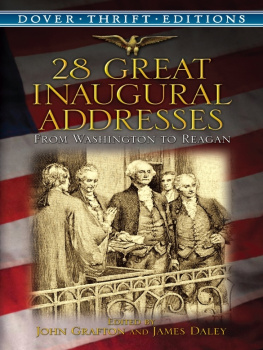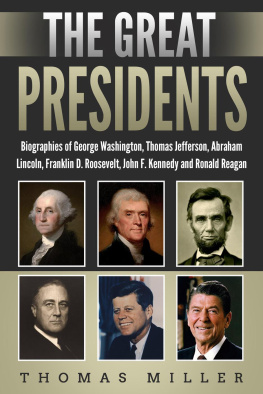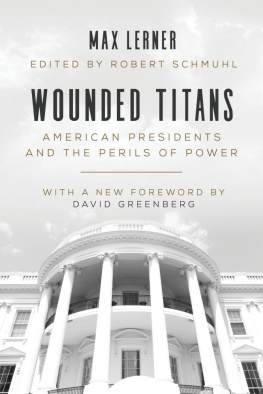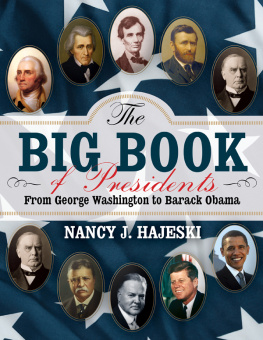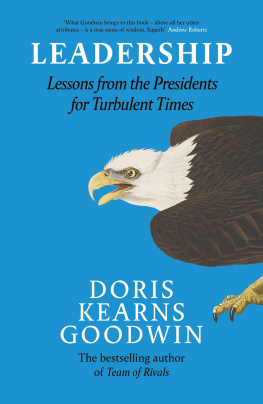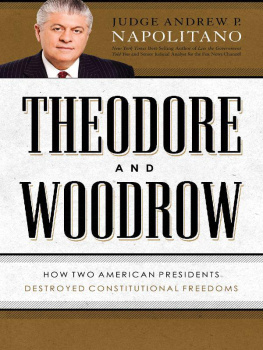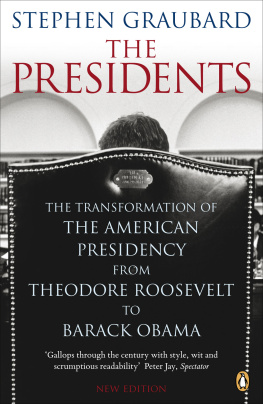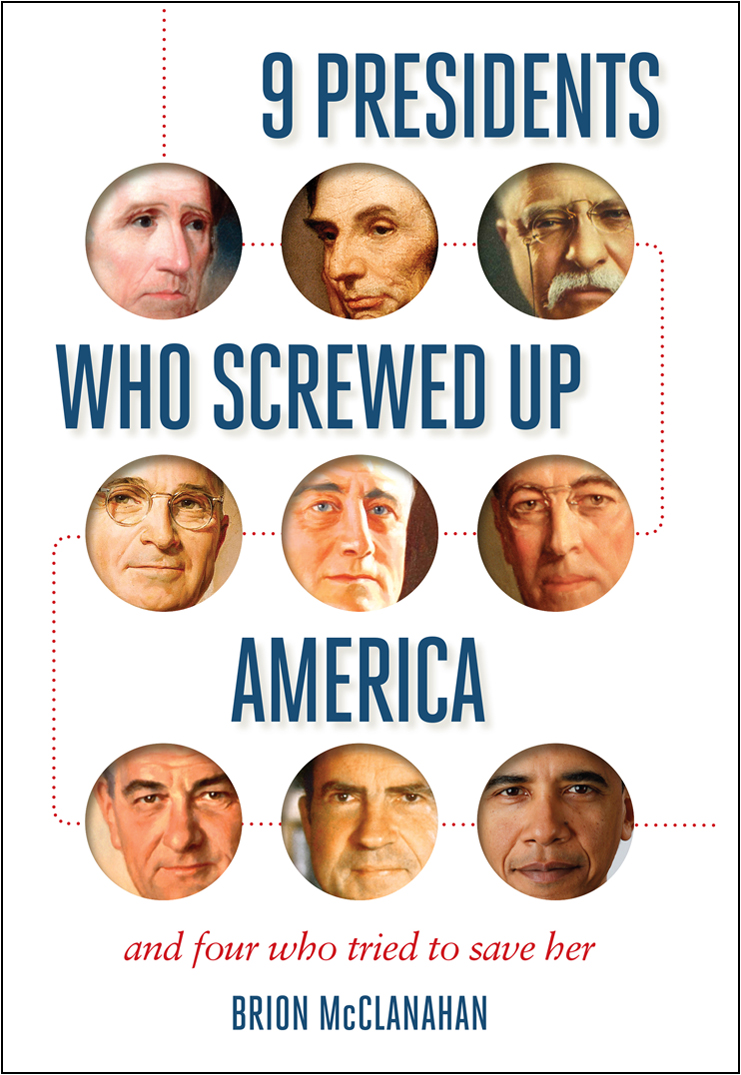PRAISE FOR
9 PRESIDENTS WHO SCREWED UP AMERICA
Every once in a while American historians will be polled regarding the men they consider the greatest presidents. Without fail, they choose those people most dedicated to the expansion of government. In this outstanding book, Brion McClanahan blasts these historians to smithereens and reveals the true history of the dangerous men who are known as our great presidents. Its about time someone did!
Thomas E. Woods Jr., author of Nullification: How to Resist Federal Tyranny in the 21st Century and The Politically Incorrect Guide to American History
James Madisons fealty to the Constitution led him to veto a bill he had asked Congress to pass and to issue a war message not asking Congress to declare war, and Barack Obama rewrote his own signature law, made recess appointments when the Senate was not recessed, and launched an aggressive war without so much as asking Congress what it thought. Brion McClanahans latest blockbuster book shows how we got from there to here by recounting the most important offending presidencies along the way. Many sacred cows are slain. This book is both a fascinating read by a master historian and a necessary guide for any voter.
Kevin R. C. Gutzman, author of James Madison and the Making of America and The Politically Incorrect Guide to the Constitution
Many people think of our American history as a series of Great Presidents. We like to rank them: Great, Near Great, Mediocre, Bad. Lincoln, Wilson, FDR, and Kennedy (or Reagan if you prefer) are on most lists as Great Presidents, inspiring heroes who overcome the past and lead America ever higher. Brion McClanahan applies a different measure of what makes a Great Presidentto what extent does he adhere to the constitutional role of the Chief Executive of the Union that was intended by the Founding Fathers? Applying this standard yields some mighty surprises. There are hundreds of books on the American presidency. This is the most original one you will ever read.
Clyde N. Wilson, distinguished professor of history emeritus, University of South Carolina
This is an insightful study which presents well McClanahans characterizations of thirteen presidents, four praised, nine castigated as dangerous to freedom. Readers may differ with him on a few of his conclusions, but everyone committed to freedom within an orderly and just society should read it.
John Pafford, professor of history at Northwood University and author of Cleveland: The Forgotten Conservative and John Jay: The Forgotten Founder
Congratulations to Brion McClanahan. As a true American historian, he tells the truth about the rogues gallery of U.S. presidents, who have stolen our freedoms, and killed millions in the process. And what great prose!
Llewellyn H. Rockwell Jr., founding chairman of the Ludwig von Mises Institute



Copyright 2016 by Brion McClanahan
All rights reserved. No part of this publication may be reproduced or transmitted in any form or by any means electronic or mechanical, including photocopy, recording, or any information storage and retrieval system now known or to be invented, without permission in writing from the publisher, except by a reviewer who wishes to quote brief passages in connection with a review written for inclusion in a magazine, newspaper, website, or broadcast.
Regnery HistoryTM is a trademark of Salem Communications Holding Corporation; Regnery is a registered trademark of Salem Communications Holding Corporation
Cataloging-in-Publication data on file with the Library of Congress
ISBN 978-1-62157-491-0
Published in the United States by
Regnery History
An imprint of Regnery Publishing
A Division of Salem Media Group
300 New Jersey Ave NW
Washington, DC 20001
www.RegneryHistory.com
Manufactured in the United States of America
10 9 8 7 6 5 4 3 2 1
Books are available in quantity for promotional or premium use. For information on discounts and terms, please visit our website: www.Regnery.com.
Distributed to the trade by
Perseus Distribution
250 West 57th Street
New York, NY 10107
To Samantha, Shannon, Savannah, Virginia, and Charlotte
Table of Contents
Guide
CONTENTS
P residents have been judged on their job performance since George Washington took the first oath of office on April 30, 1789. Not even he was immune from criticism, some of it harsh. The essayist Tom Paine wrote a stinging rebuke of the Washington administrationand of Washingtons characterjust before the first president left office in 1797. Every administration has had its critics. We can often learn more from opponents of an administration than from those who supported the president. Not that the critics are always correct. Hardly. But criticism shouldnt be dismissed as simply a partisan political maneuver. Partisan critics can be prescient. We fear those in power who think and act least like us and therefore scrutinize their every decision. This would be the Founders position as well. Jealously guarding constitutional limitations on the executive is a healthy reaction from the American polity.
With each successive administration, Americans have compared and measured the man in office against his predecessors. Even presidents themselves have attempted to attach their administration to supposed greats of the past. These comparisons provide perspective in the maelstrom of American politics. In the modern era, last weeks news might as well have been two hundred years ago, but by showing continuity between Abraham Lincoln and Barack Obama, for example, politicians hope to persuade the American public to buy their pitch and support their policies. If Franklin Roosevelt did it, then it should be good enough for George W. Bush or Bill Clinton.
THE RIGHT PRESIDENTIAL YARDSTICK
But how do Americans measure presidential success? By popularity? Effective communication? Success in achieving foreign or domestic policy goals? Energy and activity in the office? Leadership? The overall health of the country during and immediately after a presidents administration? An ideological disposition similar to that of the person ranking the president? This is a difficult question and one that Americans have pondered for decades.
The historian Arthur Schlesinger Sr. conducted the first academic poll that attempted to rank the presidents for a 1948 issue of Time magazine. The fifty-five academics surveyed found six presidents to be great: Abraham Lincoln, George Washington, Franklin Roosevelt, Woodrow Wilson, Thomas Jefferson, and Andrew Jackson. Schlesinger followed up in a 1962 poll of seventy-five historians for the New York Times Magazine. This poll dropped Jackson from the great category, but otherwise the list remained static.
The historians Schlesinger surveyed were generally left-of-center academics who favored the policies and qualities of the men on the list. Lincoln, Wilson, and FDR were reformers; Jackson presided over the Age of Democracy; Jefferson, as the first peoples president, is always portrayed (incorrectly) as a modern liberal, and Washington was the glue that held the federal Republic together. On this list, only Jeffersons administration could be classified as less than energetic, at least in regard to the public perception of the office: Jefferson deliberately downgraded the presidency during his first term in office. Washingtons careful implementation of executive powers had established precedents for executive conduct, but few followed his advice, and even he disregarded the Constitution during his second term.


